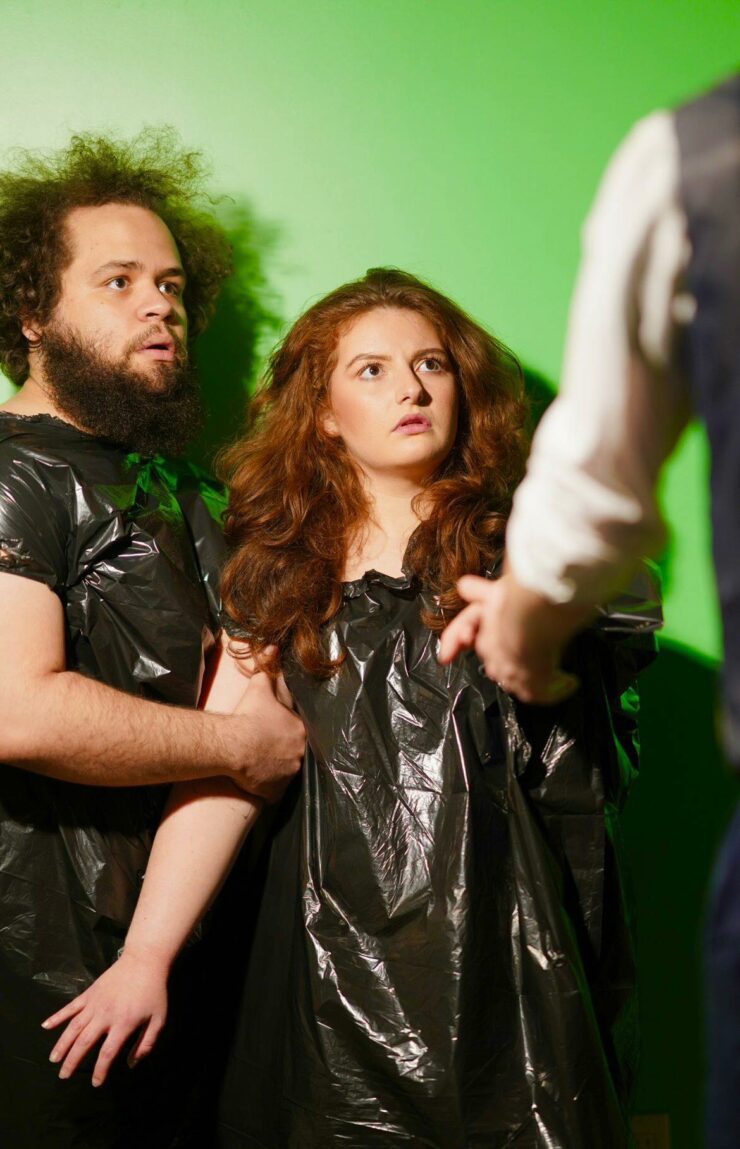Biblical clownery at the end of the world is the serving in the first of The Climate Fables that I caught at EdFringe. The pair of shows are running side-by-side every other day, described as “truthful new plays about the future of humanity in Climate Change.” The Trash Garden takes this concept to its’ most extreme in inverting the Adam and Eve story to depict the last two people on Earth. Atlas and Evelyn wade through piles of plastic and foil waste from years go by, desperate to find a sense of meaning in the baking hot radioactive heat of the sun. It isn’t quite clear what’s keeping them alive, but forces beyond the natural world soon arrive to interfere with their festering play session in the not-quite Garden of Eden, and the world will never be the same again.
Writhing in the non-degradable detritus of a society that has long disappeared, victim to the claws of climate extinction, Atlas and Evelyn are essentially reduced to babies who spend their days cycling through playground games from their childhood. They have, as Atlas later comes to realise, had a deeply extended childhood, with no figures of authority around to guide them to a civilised life or concept of adulthood. Both are unable to have children of their own for varying reasons, and their nihilistic despair exercises itself in moulding items of rubbish into playthings and reminiscing about the lives they never could have had. They call upon God to take them away, and something arrives in God’s place, a David Attenborough-impersonating mirage with objects of temptation – real food in place of the plastic they have been gnawing upon – but all is not as it seems.
The play’s philosophy interlopes visions of hopelessness surrounding climate change in the present world, and doomed imagined futures that see the skyscrapers of New York as a tourist attraction as they peak their heads above fast-rising sea levels. Evelyn exercises her frustrations in lacking meaning by rubbing pieces of garbage together to emulate systems of writing she remembers, though she is not mentally resourceful enough to actually create something that leaves a mark, so her efforts remain in vain. Atlas bumbles across the stage with little sense of self until an apparition of his long-dead father appears to unwind his current situation and delve into his tragic past. Padraig Bond’s script dallies in the abstract, referencing rational materialism and capitalism’s failure to address climate change, it is born of a deeply tangible reality, embodied in the pair’s doomed playdates.
Daubed in two black plastic sacks for the duration of the piece, the movement from the pair is strikingly faltering throughout the show. This has great effect in showing a damned vision of a very human future. We watch Kristen Hoffman’s Evelyn and Luis Feliciano’s Atlas rub and bump against each other in ineffectual attempts to replicate the real intimacy of their parents. They find themselves in an exceptionally artificial situation in terms of the ephemeral relationship to the literal piles of trash around them and also in the force of human instinct to bind together. Both Feliciano and Hoffman deliver accomplished performances that flail and dally in light of their lack of meaning.
The apparitions which appear, all played by Tibor Lazar, dominate over the pair of buffoons with anxiety-inducing ease. Lazar benefits from his proportions in comparison to the two, as he looms large over them both in height. It creates a really uneasy effect for the audience, as we eventually see the strings that he is pulling behind the scenes come to bare. His eventual performance as a Grim Reaper-esque puppet-like character is nightmarishly effective, and throughout he holds a sense of compelling doom over the two. His performance as Attenborough is funny, but comes a little bit from nowhere tonally, and his performance as Atlas’ imaginary child is a little too garish at times. These judder a little against the otherwise apocalyptic and dark undertones of the piece.
The real strength of the show is in the pungency of the eclectic vignettes between Atlas and Evelyn, and watching their sense of self entirely deteriorate over the hour. It not only puts a mental and temporal clock humanity, but richly observes the existential crisis of lethargy surrounding the climate crisis. The scene between Atlas and his father is an emotively powerful highlight, and provides a neat backstory to the otherwise bumbling clownishness of his character. While they are functional only as vignettes, the amount of black-outs that occur in the show feels unnecessary, and I would like to see a version that strings the pieces of the narrative together more concisely and without having to dim the lights entirely each time we open a new chapter.
The Trash Garden is a satirically raw, desperate call to end the lethargy around the most existential climate questions of our time. Clownishly performed with whimsy and puncture, it’s a deeply engaging tragi-comedy for the end-times. It’s perhaps no surprise that Extinction Rebellion have got behind the show, and that the show has got behind Torch Ensemble too.
Recommended Drink: Grab your finest micro-plastic filled cocktail pouch and drizzle it all over you to quench your existential thirst.
The Trash Garden plays as one of The Climate Fables every Monday, Wednesday, and Friday at 14:00 until August 19th. Tickets are available through the EdFringe Box Office.









